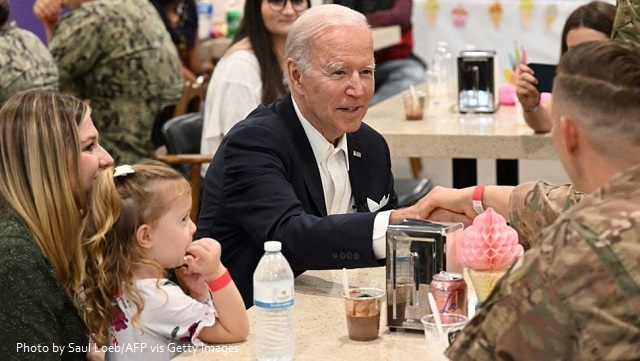The U.S. Military Is Quietly Using A Little-Known Program To Enable Child Sex Changes
By The Daily Caller

The U.S. military is quietly making accommodations for military families with children or dependents seeking gender transition help through a little-known program initially meant to assist families with special needs members.
Through the Exceptional Family Member Program (EFMP), the military has allowed special assignments for servicemembers so their dependents can access gender transition services, and could take additional steps to facilitate transition, according to media reports, Department of Defense (DOD) statements and the policies themselves. Current DOD guidance leaves open the possibility servicemembers with gender dysphoric dependents could be eligible for exceptions to policy under the EFMP, but there is a provision in the House’s draft defense bill that could make it illegal.
Republican Rep. Ralph Norman of South Carolina introduced an amendment, included in the draft text of the National Defense Authorization Act for fiscal year 2024, that would prohibit DOD from making accommodations for gender transition services under the EFMP.
The House agreed to the amendment by a vote of 220-210.
“In my opinion, this misuse of funds is absolutely against the spirit of the law. Gender transitioning is not covered under any of the criteria for identifying individuals eligible for EFMP,” Norman said in a statement to the Daily Caller News Foundation.
“Allowing ANY type of gender transition procedures through the EFMP goes against the intention for the program — which is to provide vital resources for service members’ families with special needs and chronic conditions,” he added.
No companion amendment exists in the Senate version, however, imperiling the provision’s chances of making it into the final legislation.
In 2021, a measure that would have “expand[ed] protections” for dependents with a diagnosis of gender dysphoria failed.
Democratic Rep. Jimmy Panetta of California introduced a bill expanding protections under EFMP to explicitly include “gender dysphoria” as a “medical or educational special need,” allowing servicemembers to request duty assignments or extra medical support for dependents diagnosed with the disorder. It would have effectively banned the services from stationing troops with transgender dependents in stations within the U.S. or abroad where the law bans gender transition services, according to a summary.
The Defense Department is working to improve the Exceptional Family Member Program with several initiatives, the director of DOD’s office of Military Family Readiness Policy told Congress, Feb. 5. https://t.co/uDqcYpld2o pic.twitter.com/QIKSIpwQld
— Department of Defense 🇺🇸 (@DeptofDefense) February 8, 2020
The Air Force was the only service openly expanding EFMP to include gender transition accommodations. At the time, EFMP policy and implementation varied between the Air Force, Navy and Army sometimes down to the installation level, according to a DOD article.
But, DOD has regulatory authority to create or change the criteria for considering an individual’s special needs, according to the law creating the DOD’s Office of Special Needs. Services have the ability to build on to what the Secretary of Defense mandates.
The Secretary of Defense issued revised instruction in late June meant to synchronize the EFMP between services but did not explicitly address gender dysphoria. Language outlining an eligible dependent family member remains largely unchanged.
But a research report published after the policy was unveiled does tie the EFMP to gender transition services.
“Dependent family members diagnosed with gender dysphoria,” as characterized in the Diagnostic and Statistical Manual of Mental Disorders, “could also be eligible to enroll in EFMP,” according to a Congressional Research Service report. Gender dysphoria would fall alongside other “current and chronic” mental health condition requiring inpatient or intensive outpatient mental health treatment where families “may access additional family support services,” the report stated.
Support services can include information and referrals, case management and maintaining school liaisons for dependents up to 21 years old, according to the policy.
While EFMP coordinators can make travel recommendations “solely based on the availability of specific medical needs for the health and safety of the enrolled family members,” they are not the final authority in those decisions, Cmdr. Nicole Schwegman, a Pentagon spokesperson, told the DCNF.
In addition, “the provision of medical care is not a component of EFMP,” Schwegman said. TRICARE, the military’s health plan, already covers several gender transition treatments and procedures.
In theory, at least, any military family with a member who can get an official diagnosis of gender dysphoria would be eligible for an EFMP.
“Right now, transgender dependents can and are enrolled in the EFMP,” the Modern Military Association (MMA) wrote.
“Many people falsely assume ‘gender-affirming care’ means giving kids hormones and surgeries,” MMA wrote, but for young children it still “includes having access to specialists who understand what they’re going through and can provide the youth and their family appropriate mental and emotional support.”
The EFMP could be used to make it easier for children to access specialists and medical care, according to MMA.
“All servicemembers and dependents who are confused about sexual identity deserve compassion and competent psychological care. Under DoD regulations, however, the military’s medical system has been directed to provide medical advice and treatments only in the one-way direction of transition,” Elaine Donnelly, founder of the Center for Military Readiness, told the DCNF.
Data on the number of military families taking advantage of the program was not available at the time of posting. As of early July, the Air Force confirmed it granted 15 relocations under “exceptions to policy (ETP) for members experiencing a range of racial- and LGBTQ+-related discrimination” since 2021, without specifying whether the waivers were allowed under EFMPs, Military.com reported.
None of the other services is tracking family locations, public affairs officers told the outlet.
In 2017, when TRICARE began offering sex change interventions, at least 2,500 children of military parents put in for gender dysphoria benefits through TRICARE insurance, according to a study published in JAMA Pediatrics. About 900 received the puberty blocker GnRH-a or sex change hormones.
This article has been updated with comment from a Pentagon spokesperson.
AUTHOR
MICAELA BURROW
Investigative reporter, Defense.
RELATED ARTICLES:
Is Gender Mutilation the New Face of Brands?
EDITORS NOTE: This Daily Caller column is republished with permission. ©All rights reserved.
All content created by the Daily Caller News Foundation, an independent and nonpartisan newswire service, is available without charge to any legitimate news publisher that can provide a large audience. All republished articles must include our logo, our reporter’s byline and their DCNF affiliation. For any questions about our guidelines or partnering with us, please contact licensing@dailycallernewsfoundation.org.

This article is courtesy of DrRichSwier.com, an online community of citizen journalists, academics, subject matter experts, and activists to express the principles of limited government and personal liberty to the public, to policy makers, and to political activists. Please visit DrRichSwier.com for more great content.

